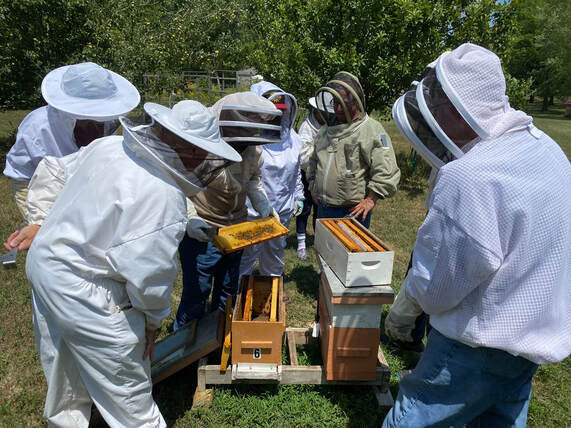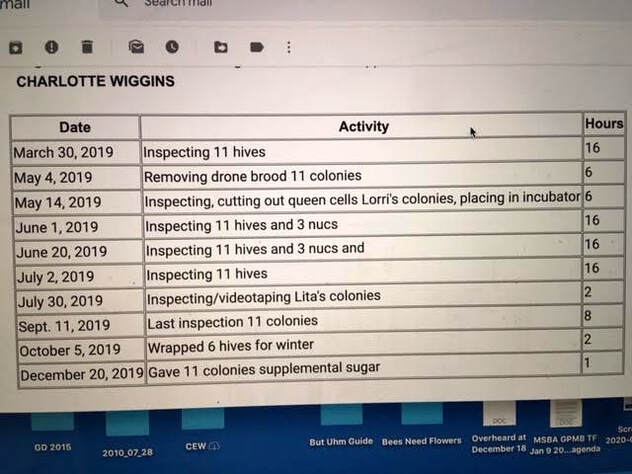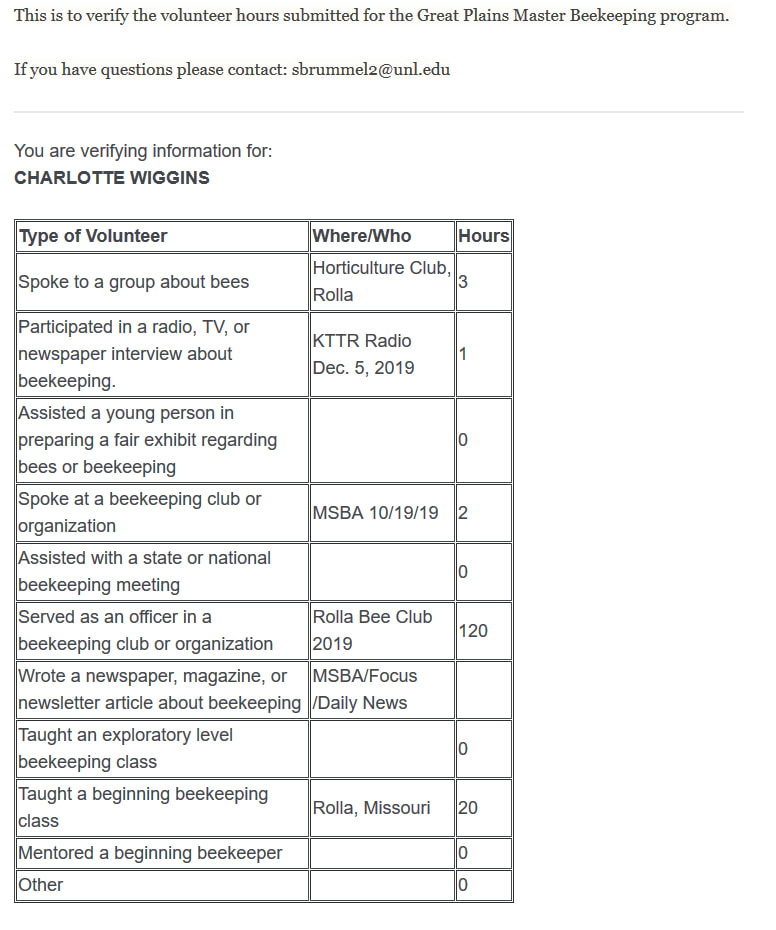 Beekeepers get hands on experience at Rolla Bee Club's GPMB Teaching Apiary. (Charlotte Ekker Wiggins photo)
Beekeepers get hands on experience at Rolla Bee Club's GPMB Teaching Apiary. (Charlotte Ekker Wiggins photo)
Great Plains Master Beekeeper Program (GPMB)
The Great Plains Master Beekeeping program is a collaborative group of beekeepers spanning the Great Plains region and integrating beekeeping organizations from Wyoming, Michigan, Nebraska, Kansas, Iowa, Indiana and Missouri. The program is highly dependent on extension professionals and experienced beekeepers to bring their expertise and knowledge to both new and advanced beekeepers.
Rolla Bee Club is a GPMB partner as of 2019.
The Great Plains Master Beekeeping program is a collaborative group of beekeepers spanning the Great Plains region and integrating beekeeping organizations from Wyoming, Michigan, Nebraska, Kansas, Iowa, Indiana and Missouri. The program is highly dependent on extension professionals and experienced beekeepers to bring their expertise and knowledge to both new and advanced beekeepers.
Rolla Bee Club is a GPMB partner as of 2019.

GPMB Purpose
The Great Plains Master Beekeeping Program (GPMB) provides training, education, outreach, and mentoring for beginning and advanced beekeepers that will improve colony survival and drive economic success. This program will focus on scientifically-based best management practices for colony management, bee biology, pests, pathogens and other stressors, as well as land stewardship, business and marketing, and professional development.
GPMB works with partners to develop beekeeping knowledge as well as being competent advocates for bees.
GPMB Partners
GPMB partners are an integral part of the program. Partner associations provide a base for members of the program to meet and share their knowledge with a community of beekeepers near them. Partner Associations also provide courses and outreach opportunities for members of the regional Great Plains Master Beekeeping program.
Structure
The GPMB training program is structured with multiple tiers (exploratory, apprentice, journeyman, master) where participants may advance to higher levels at their own pace to refine their knowledge and management skills. To advance levels, beekeepers must meet a set of educational, field training, and volunteer or mentoring service requirements designed to build off the knowledge and skills gained from the previous level(s). The flexibility of this system allows GPMB to address state-specific needs and demands and will also make it easier to expand and be adapted in other states.
Field Training
Field training hours are required for each level of GPMB. Field training exists so beekeepers are versed in the technical knowledge of how to keep bees, and in the subtle nuances of maintaining them. All the practical knowledge from workshops and courses will become more apparent when you experience the concepts inside of a living beehive. Ensure you are working with a beekeeping mentor from your association or club when you get started, especially since they must verify your hours to receive credit (if you need a mentor please reach out to your association or Great Plains Master Beekeeping).
Types of accepted field training:
Volunteering is a critical aspect of the GPMB program because it promotes community involvement and builds experience as an advocate for bees. Advocating for bees to the public will make beekeeping a more central topic and push changes at a larger level that can benefit the entire beekeeping community. Volunteering also bolsters your confidence as a beekeeper as you become more engaged with your community. You can volunteer through bee associations or even reach out to the Great Plains Master Beekeeping program and get set up with outreach events near you. Just remember to have a mentor or someone to contact that can vouch for your service.
Volunteer Hours can be earned by:
The Great Plains Master Beekeeping Program (GPMB) provides training, education, outreach, and mentoring for beginning and advanced beekeepers that will improve colony survival and drive economic success. This program will focus on scientifically-based best management practices for colony management, bee biology, pests, pathogens and other stressors, as well as land stewardship, business and marketing, and professional development.
GPMB works with partners to develop beekeeping knowledge as well as being competent advocates for bees.
GPMB Partners
GPMB partners are an integral part of the program. Partner associations provide a base for members of the program to meet and share their knowledge with a community of beekeepers near them. Partner Associations also provide courses and outreach opportunities for members of the regional Great Plains Master Beekeeping program.
Structure
The GPMB training program is structured with multiple tiers (exploratory, apprentice, journeyman, master) where participants may advance to higher levels at their own pace to refine their knowledge and management skills. To advance levels, beekeepers must meet a set of educational, field training, and volunteer or mentoring service requirements designed to build off the knowledge and skills gained from the previous level(s). The flexibility of this system allows GPMB to address state-specific needs and demands and will also make it easier to expand and be adapted in other states.
Field Training
Field training hours are required for each level of GPMB. Field training exists so beekeepers are versed in the technical knowledge of how to keep bees, and in the subtle nuances of maintaining them. All the practical knowledge from workshops and courses will become more apparent when you experience the concepts inside of a living beehive. Ensure you are working with a beekeeping mentor from your association or club when you get started, especially since they must verify your hours to receive credit (if you need a mentor please reach out to your association or Great Plains Master Beekeeping).
Types of accepted field training:
- Working your own hives with mentor or other beekeeper
- Hive inspections/checks
- Extracting or harvesting honey
- Treating your bees
- Building equipment for your bees
- Processing beeswax or other hive product
Volunteering is a critical aspect of the GPMB program because it promotes community involvement and builds experience as an advocate for bees. Advocating for bees to the public will make beekeeping a more central topic and push changes at a larger level that can benefit the entire beekeeping community. Volunteering also bolsters your confidence as a beekeeper as you become more engaged with your community. You can volunteer through bee associations or even reach out to the Great Plains Master Beekeeping program and get set up with outreach events near you. Just remember to have a mentor or someone to contact that can vouch for your service.
Volunteer Hours can be earned by:
- Speaking to a civic group, school, 4-H, or other group about bees, beekeeping, or pollination.
- Participating in an interview for a radio, TV, or newspaper story about beekeeping.
- Assisting an individual in preparing a state or county fair exhibit (regarding bees or beekeeping).
- Speaking to a club about some aspect of beekeeping.
- Attend a state or national beekeeping meeting. - Serve as an officer in a beekeeping club or association.
- Spending time working an educational display or exhibit regarding bees or beekeeping.
- Organize a new bee club or association.
- Write a newspaper, magazine, or newsletter article about some aspect of beekeeping.
- Teach an exploratory level beekeeping class (Journeyman/Master level).
- Teach a beginning beekeeping class (Master level only).

